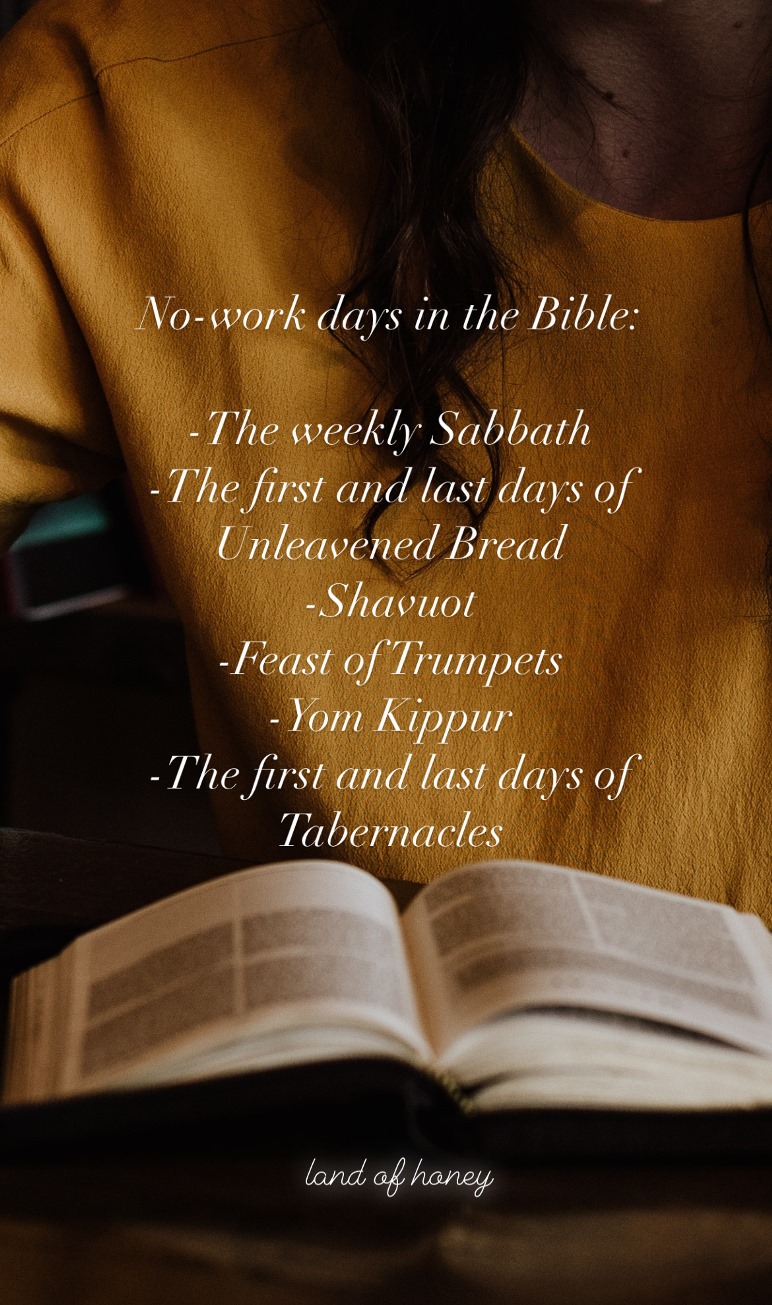What is a Sabbath day in Scripture? We know that one of the ten commandments is a directive to honor the Sabbath day by keeping it holy...but when are the Sabbath days and what do you need to do to keep them holy? This post will examine what it means to when the Bible says not to work on Sabbath days, which are sometimes referred to as "no-work days," after verses stipulating that we are not to do any work on these days.
When are the Biblical Sabbath days?
The weekly Sabbath. This is the seventh day of the week because "on the seventh day God rested." (Genesis 2:2)
The first and last days of the Feast of Unleavened Bread.
Shavuot.
Feast of Trumpets.
Yom Kippur.
The first and last days of Tabernacles.
What is a Sabbath day supposed to be like?
These are days to rest; we should avoid ordinary work, professional or otherwise. We get ourselves into trouble when we focus on human ideas about the Sabbath...like saying that your house needs to be spotless or the toilet paper needs to be torn ahead of time or that you need to sit down to a formal dinner complete with ceremonial blessings at an exact time, because those are not commandments. If your house is clean for the Sabbath good for you, but if it isn't you are certainly not doomed to have some sort of lesser Shabbat.
Stick with the commandments: don't work. Rest.
So we should have the no-work days for the feasts off from our jobs, in addition to the weekly Sabbath. Scripture uses the phrase, "ordinary work," or "servile work," regarding what we should steer clear from on these days. This means it's not just a day off from work to do house projects or to spend in the kitchen whipping up a feast for your congregation. I think that's incredibly freeing and beautiful. We've all attended way too many special events or family get-togethers where one or two people sacrifice their day to prepare and organize the meal, while 20 other people relax in the living room. And mostly it's women who are working so hard so that their family can relax. When YHWH pulled work off the table for these days, I have no doubt he meant this as a way to get women celebrating and relaxing with everyone else. And because it's a Sabbath day and work is forbidden, no one has any expectations of being served by them and they have no guilt about keeping this command. What a lovely gift.
Not working is synonymous with not shopping. I, for one, basically always feel like shopping is a lot of work, but even if you don't the idea of a day of rest is to do just that. Rest. Not running errands to cross off the list. Not causing someone else to work on one of YHWH's no-work days. Nehemiah 13:17 calls buying and selling on these days "profaning the Sabbath." Put your wallet away and enjoy these days purchase free.
A holy convocation.
Don't miss that in addition to resting, we are to have a holy convocation. In other words a gathering with believers to celebrate these set-apart times. You know, a party. This can be a challenge, but if possible get together with people willing to celebrate these days. If there's a time to make a drive to meet with believers, this is it! Make it happen, plan something fun. One of the meanings of convocation in Scripture is reading, so make it a point to read appropriate passages from Scripture as part of your festivities.
That's the gist of a no-work day. Pretty easy, isn't it? It's a major loss that so many have believed the lie that these days are about jumping through hoops or that it's too hard for us. What could be easier or less of a burden than a day off, spent with family and friends? When YHWH gave us these commandments he did so because they are good for us!
Sabbath days are:
A day to rest!
Time to remember the awesomeness of YHWH.
Celebration of his set apart times.
Level ground for all. No one is stuck serving or in the kitchen on these days.
A happy change of pace from everyday chores.
Restorative.
An opportunity to spend time with others of the Hebrew faith.
Joyful!
Showing posts with label high holidays. Show all posts
Showing posts with label high holidays. Show all posts
Subscribe to:
Comments (Atom)
Upcoming Biblical Holiday Dates 2026
Here's When the Biblical Holidays Happen in 2026
This is when the Biblical holidays happen in 2026. If you're looking for this year's dates for Passover, Unleavened Bread, First Fru...








